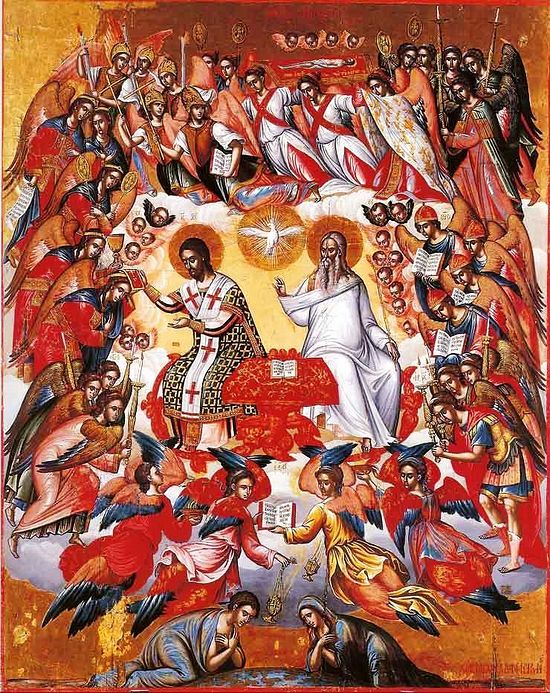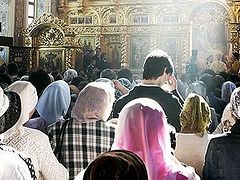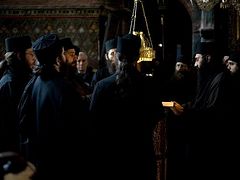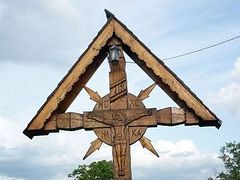Source: Orthodox Christian Prison Ministry
February 26, 2016
Deuteronomy 26:1-11, especially vs. 11: So you shall rejoice in every good thing the Lord your God gave you and your house, you and the Levite and the resident alien among you.
The Prophet Moses’ commandments to the ancient people of God concerning worship can enrich our own appreciation of the Divine Liturgy. As Saint Athanasios the Great urges: “Israel of old, having first as a figure striven for the victory, came to the feast ... But we, my beloved, the shadow having received its fulfillment, and the types being accomplished, should no longer consider the feast typical ... but in accordance with the injunction of the Apostles ... go beyond the types, and sing the new song of praise” (“Fourth Festal Letter,” NPNF Second Series, vol. 4, p. 516).
When we come to the Divine Liturgy to celebrate Christ our God, we follow Moses’ guidelines in a sense, for we “take some of the first of all the produce ... which the Lord your God” has given (vs. 2). The priests “set it down before the altar of the Lord your God” (vs. 4) and call on the Lord (vs. 2), declaring all He has done (vs. 3). We “rejoice in every good thing the Lord your God gave” to us and to our households (vs. 11).
We rejoice to be part of “the Church of the living God” (1 Tim 3:15) that offers, sings hymns, blesses, and praises God, who is “ineffable, inconceivable, invisible, incomprehensible, ever existing and eternally the same.” We give thanks for “the dispensation for us” that Christ fulfilled and rejoice in the true light, the heavenly Spirit, the true faith that we have found by “worshiping the undivided Trinity: for He hath saved us” (Divine Liturgy of Saint John Chrysostom).
Moses gave instructions to take “the first of all the produce” of our labor and “put it in a basket,” then “go the place” blessed by God for worship (Dt 26:2). “Go to one who is priest” who shall “take the basket out of your hands and set it down before the altar of the Lord your God” (vss. 3-4). These acts clearly foreshadow the offertory of the Divine Liturgy. We bring loaves of bread that represent ourselves and our labor. From one of the loaves the priest takes a portion called the Lamb, placing it on the diskos “in remembrance of our Lord and God and Savior, Jesus Christ.” At the Great Entrance, this oblation is borne to the altar and offered to God.
The liturgy serves as the principal means by which the Church on earth joins with the hosts of heaven to call upon the name of the Lord (vs. 2). Yes, the Lord has extended filial privilege even to us, so that we may dare to call upon Him, “the heavenly God,” in words that exceed Moses’ prayer: “Our Father, Who art in heaven, hallowed be Thy Name ...”
The prayers and hymns of the liturgy speak of that which “the Lord swore to our fathers to give us” (vs. 3). His promises include salvation and a kingdom that exceeds any expanse of land on earth. God the Father gives His Only-begotten Son to all nations, “that whoever believe in Him should not perish but have everlasting life” (Jn 3:16). Through the Cross, the Resurrection, the ascension into heaven, and second and glorious advent of Christ, the Life-giving Trinity raises us up again, brings us back to heaven, “endowed ... with [His] Kingdom which is to come.”
In our worship we are blessed with numerous occasions to “rejoice in every good thing the Lord [our] God gave” us (Dt 26:11). Thus with good reason we chant in exaltation: “We praise Thee, we bless Thee, we worship Thee, we glorify Thee, we give thanks to Thee for Thy great glory. O Lord, heavenly King, God the Father Almighty; O Lord, the Only-begotten Son, Jesus Christ; and the Holy Spirit” (Doxology).
O Son of God, accept me today as a communicant; for I will not speak of Thy mystery to Thine enemies; but like the thief, will I confess Thee. Remember me, O Lord, in Thy Kingdom. – Precommunion Prayer




